KB ID 0001360
Problem
Applicable To: This procedure works on all versions of Exchange Newer than Exchange 2010 SP1 (update rollup 8). If your Exchange server is OLDER than that you will need to use the following link;
Exchange 2007 / 2010 (Pre SP1)- Export Mailbox’s to PST files
The following procedure exports a user mailbox to a PST file on a network share.
Solution
Note: Not Even ‘Exchange Organisation Administrators” have the right to import / export mailboxes, you need to grant those rights to your user object, (or a better approach would be to create an admin account just for this purpose, then delete it when you are finished).
New-ManagementRoleAssignment –Role "Mailbox Import Export" –User {username}
Note: This grants import, and export rights.
Create a file share on a drive with plenty of space, ensure the Exchange Trusted Subsystem has read / write access. And ensure the SYSTEM account has full control.
To create the ‘Export Request’
New-MailboxExportRequest -Mailbox “mailbox-alias” -FilePath \\server-name\share\file-name.pst
Note: Add “-IsArchive” to the end of the command for Archive Mailboxes.
Note2: If the export repeatedly fails, add -BadItemLimit 200 to the end and try again, you can also use the -AcceptLargeDataLoss in exceptional circumstances
To view progress;
Get-MailboxExportRequest OR Get-MailboxExportRequest | Get-MailboxExportRequestStatistics
When complete, you need to remove the move request(s);
Using Content Filters
You can specify a content filter to only export emails after a certain date all mail received after 01/01/17 e.g.
Or to export emails between two dates;
Using IncludeFolders (and Exclude Folders)
You can specify IncludeFolders (or ExcludeFolders) to only export emails from certain folders, e.g.
Only export Inbox (and sub-folders) and Sent Items;
New-MailboxExportRequest -IncludeFolders “#Inbox#/*”,”#SentItems#” -Mailbox {mailbox-alias} -FilePath \\{server-name}\{folder}\{file-name}.pst
Don’t Export Sent Items and Deleted Items;
New-MailboxExportRequest -ExcludeFolders “#SentItems#”,”#DeletedItems#” -Mailbox {mailbox-alias} -FilePath \\{server-name}\{folder}\{file-name}.pst
Export ALL Mailboxes to PST
Related Articles, References, Credits, or External Links
Exchange 2000 / 2003 – Exporting Mail to .pst files with ExMerge
Exchange (2010 Post SP1 and Newer) Bulk Importing Mail From PST Files

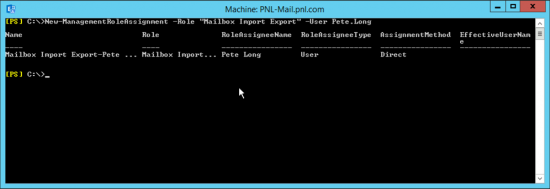
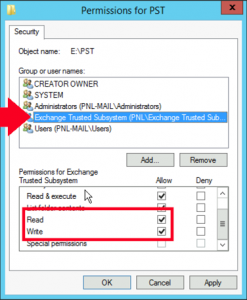
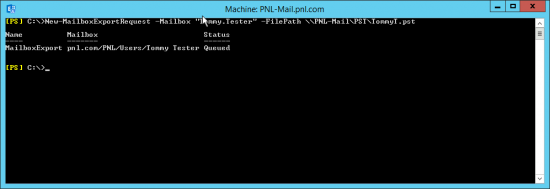
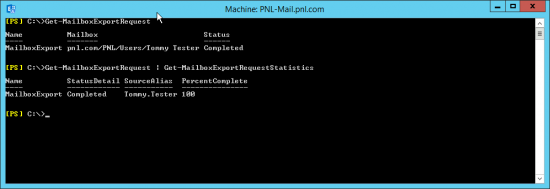
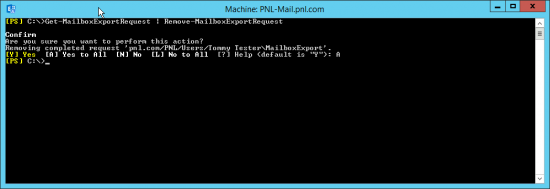
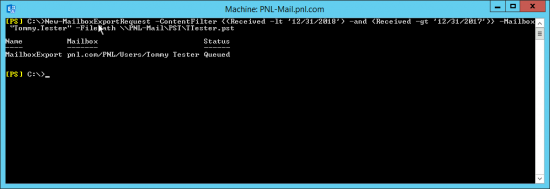
26/10/2018
Command to export pst to a different partition (E:)
29/10/2018
Put the UNC Share on E: then use the same command 🙂
P
24/07/2020
Hi.
How to export the mailbox to PST using alphabet. Example. Users with “A”, Users with “B”., C, D, E …
This for to run the script step for step
Regards
28/07/2020
I’ve never done it, but why not simply do something like Get-Mailbox -Filter ‘DisplayName -like “a*”‘ and Pipe that into the Export request?
06/10/2021
Pete,
I’m always relieved when I see a google hit on one of your posts.
Techs like you are a dying breed. Thank you for the work you do.
-Steve
12/10/2021
Thanks Steve – Yep I’m an old dinosaur!